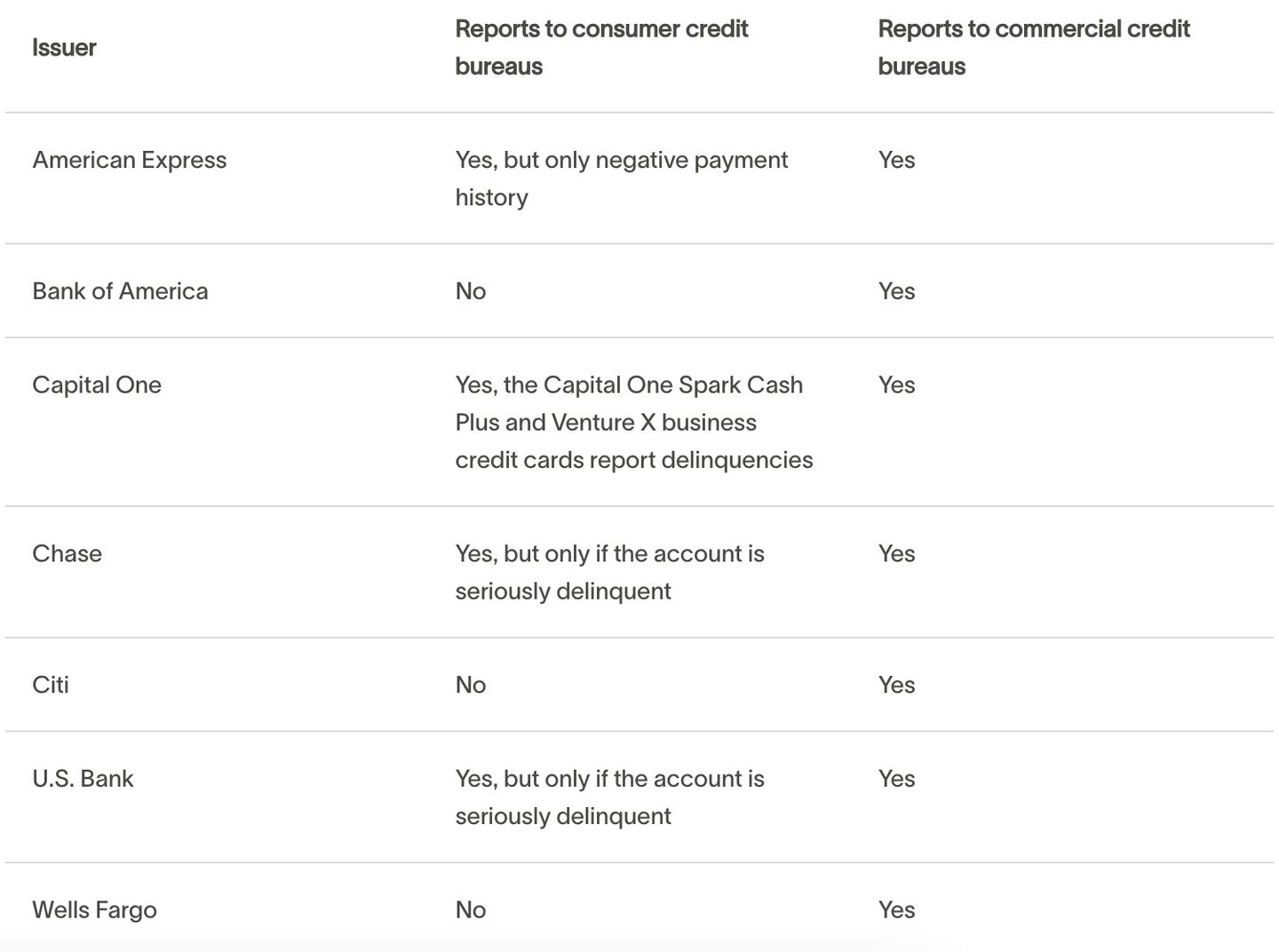A business credit card can affect your personal credit score, but it depends on the type of card, how the provider reports your card activity to credit bureaus, and how you use the card.
Understanding How Business Credit Cards Can Affect Your Personal Credit Score
If you apply for a business credit card, your personal credit score will likely take a temporary hit due to a hard inquiry from the credit card issuer, Ramp reports. However, the impact is usually minor and brief.
This is because business credit card issuers usually rely on your personal credit for approval, in addition to a personal guarantee that holds you to pay off any debts on the card if your business fails.
After the initial hard credit inquiry, card issuers may report both positive and negative card activity to credit bureaus, such as Equifax or Experian. On-time payments can improve your score, and late payments may reduce your credit score.
Likewise, any other business debts that are attached to your SSN will affect your personal credit score. So, be careful before attaching a personal guarantee to any business loan.
Getting a business credit card using your EIN number helps build your business credit. A good business credit score can lead to more favorable loan terms and repayment options.
Understanding Business Credit vs. Personal Credit
Your business credit score is linked to your Employer Identification Number, or EIN, which is your business's tax ID number. You can apply for an EIN number online after you've registered your business with the state. Your business credit score is used to apply for credit accounts, like small business loans and lines of credit. You can check your business credit score with the business credit bureaus: Dun & Bradstreet, Equifax, and Experian.
Your personal credit score, often called a FICO score, is tied to your Social Security Number, or SSN. This score reflects your personal financial history, including credit card usage, loan repayment, and other financial activities tied to your personal identity. Personal credit scores play a significant role when you're seeking personal loans, mortgages, or other forms of personal financing.
If you don't have a good business credit score—which is difficult for newly established businesses—your personal credit score will likely be used to access business financing as well. You can check your personal credit score with the major consumer credit bureaus: Equifax, TransUnion, and Experian.
Personal vs. Business Credit Bureaus
The key difference between personal and business credit bureaus is that business credit reports are used to assess the financial health and creditworthiness of businesses, while personal credit reports are used to evaluate individuals' credit behavior and ability to repay personal debts.
Which Business Credit Cards Report to Personal Credit Bureaus?
Business credit card activity usually isn't reported to the personal credit bureaus, but there are some exceptions.
Certain business credit cards, like the Capital One Venture X Business and Capital One Spark Cash Plus, will report late payments and serious delinquencies to the consumer credit bureaus, negatively impacting your personal credit score.
If you have a business credit card from American Express or U.S. Bank, late payments will also show up on your personal credit report.
Ramp
Can You Build Personal and Business Credit at the Same Time?
Personal credit cards don't build business credit, and vice versa, so you cannot build personal and business credit at the same time. Use business credit cards and personal credit cards separately, limiting business credit cards to business expenses.
Whose Credit Do Business Credit Cards Affect?
When business credit card activity is reported to the consumer credit bureaus, it typically only affects the primary cardholder—that is, the business owner who opened the card and personally guaranteed any credit card debt. Sometimes, a business owner may add an authorized user to their business credit card. In that case, the authorized user's credit report could also be affected.
Here's what it means to be a primary cardholder or an authorized user on a business credit card:
Primary cardholders
Whoever applies for and is approved for a small business credit card is considered the primary account holder. Usually, this is the owner of the company, not an employee.
When you open the card as the primary account holder, the tax identification number you provide will determine whether the card reflects on your personal or business credit score. If you open the card with your SSN, it'll be linked to your personal credit score. Opening the card with your business's EIN will keep your business credit score separate.
If you open a card with your SSN, you'll probably also have to provide a personal guarantee of repayment so that lenders know you'll personally repay any debts if your business account defaults on its payments.
Authorized users
An authorized user is someone who has been added to a credit card account by the primary cardholder—usually, this is an employee. This allows the employee to make purchases on the card as if it were their own.
As an authorized user, your credit score will reflect how both you and the primary cardholder use the card. If the account holder makes timely payments, then it'll help build your credit score. If the account holder fails to make payments, however, your credit score will take a hit.
If a card can be used by more than one person, the business needs a system that identifies who used the card and who must approve the purchase.
Does a Corporate Credit Card Affect Your Credit Score?
Generally, with corporate credit cards, your personal credit score won't be affected. This is because most corporate cards are opened using your business's EIN number, not your personal SSN. Business owners and employees both shouldn't see any changes to their personal credit scores when a corporate card is used.
As a business owner, corporate cards differ from traditional business credit cards in how they affect your business credit report. This is because:
- Corporate cards don't factor in credit utilization ratios. That means you don't have to worry about how much of your available credit you've used out of your credit limit, like you would with a traditional credit card.
- Corporate cards typically require full monthly balance payments, often automatically drawing from your business bank account. This eliminates the possibility of late payments and credit card debt being reported to the credit bureaus.
The only case in which a corporate card would affect an employee's personal score is if the business made a billing mistake and added it in their name. If you see that a corporate charge card appears in a personal credit check, take steps to speak with the person in your company issuing the cards to remove your name.
How Does an LLC Affect a Credit Report?
If your LLC has debts taken out in the company's name, only the LLC's credit score will be impacted by whether you repay your debts on time. An LLC loan will only impact your personal credit if you cosign or guarantee it. If you don't do so, your personal credit report will remain unaffected.
This story was produced by Ramp and reviewed and distributed by Stacker.








